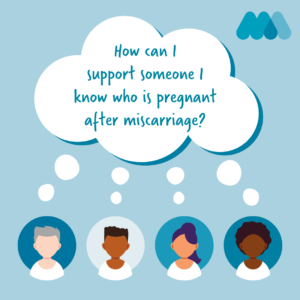Supporting someone who is pregnant after miscarriage
This section is for you if you are supporting someone who is pregnant after a miscarriage, ectopic or molar pregnancy*.
 If you haven’t experienced a loss yourself, it might be difficult for you to fully understand how they are feeling.
If you haven’t experienced a loss yourself, it might be difficult for you to fully understand how they are feeling.
Pregnancy after loss takes courage and strength. Many people say that they can no longer trust their body. They live in fear of something going wrong again. The strain of waiting and enduring ongoing uncertainty about something so important and life-changing can be exhausting. Many women and their partners do endure this time, but often in private and without support.
A small amount of early research[1] has found that supportive care and ongoing emotional support may make a difference in preventing unexplained recurrent miscarriage. This included regular scans and clear information plus being taken seriously, listened to and empathised with.
As a friend, partner or family member you can help by taking their emotions seriously, listening and empathising.
Here are some ideas to help you make things a little easier for them. You might also find it helpful to look at our leaflet Supporting someone you know.
Listen to Jacqueline talk to Clare about her experience and how her partner, family and friends were involved. You can read the transcript here.
- Try to understand. Reading our information can help you understand more about how they might be feeling and the support they need. Reading and listening to others’ stories can help you understand too.
- Don’t try and argue their feelings away. You are unlikely to be able to reduce their fears with rational arguments and statistics. Try not to diminish their emotions or argue them away. It would be unusual for them not to feel anxious and unhappy at least some of the time.
My friend said it would be good for me to get some reassurance at the scan, but for me that wasn’t a given. It could be the opposite of reassurance. It always had been in the past.
- Support them to seek the help they need. This might be attending appointments, support groups or scans with them, helping them to find the right counsellor or going to the Early Pregnancy Unit for an emergency check-up. Remember that some of their needs may not feel rational to you, but may provide some much-needed release from stress for them.
- Encourage them to talk to healthcare professionals about how they feel. There may be extra support they can access.
- Be patient and understand if they do things differently. They may not tell you they are pregnant as soon as you would have liked. They may not want to do things to acknowledge the pregnancy in case they jinx it.
- Encourage them to do things to manage their anxiety and stay calm. Things like exercise, relaxation, meditation, yoga and mindfulness are unlikely to make difficult feelings go away completely but may help reduce stress and make things easier to bear.
 Don’t try to solve things. Sometimes people don’t need someone to try and fix their pain. They need someone to acknowledge what they are feeling and support them while they feel it.
Don’t try to solve things. Sometimes people don’t need someone to try and fix their pain. They need someone to acknowledge what they are feeling and support them while they feel it.
- Check-in with them regularly, especially around times that might be difficult for them. Make a note of important dates in your diary so you don’t forget. These might be in the run-up to scans, after scans, around the dates of previous losses and at the time in this pregnancy where they lost their baby previously. Good news at scans may not feel reassuring for very long.
I was just going through the motions of life, all my focus was inwards and on the pregnancy, my anxiety and the sickness. I didn’t have the energy to keep up with people but it would have helped if they had been in touch to let me know they were thinking of me.
- Don’t assume or act as if this pregnancy makes ‘everything ok’ – it may do but most people will still grieve those they have lost and may feel guilty they are replacing them.
- Stay in touch whatever happens. If they lose this pregnancy too they will need a lot of support. If the pregnancy is successful and they have their baby, they may still struggle but feel less able to ask for help.
- Offer practical help with preparations. As they get closer to the birth they will need to sort out practical issues like car seats and a hospital bag. This can cause anxiety in women who are worried that doing so will ‘jinx’ the pregnancy. It may help to offer them support with making preparations and finding the basics.
- Look after yourself too. It’s important to make sure you stay well and have time to process your own emotions too. Supporting someone else can be draining, particularly if you are not sure what they need or feel they are not dealing with things in the way you would, or did. If you are pregnant or have experienced a loss or losses yourself, you may need to take extra care. You do not need to stop being there for them but you may find it helpful to suggest additional sources of support too or ask other family members and friends to step in.
[1] Liddell HS, Pattison NS, Zanderigo A. Recurrent miscarriage–outcome after supportive care in early pregnancy. Aust N Z J Obstet Gynaecol. 1991 Nov;31(4):320-2. doi: 10.1111/j.1479-828x.1991.tb02811.x. PMID: 1799343.
* Please note that we often use the term ‘pregnancy loss’ to include miscarriage, ectopic and molar pregnancy. But sometimes, using the word ‘miscarriage’ for all three makes it easier for people to find the information they’re looking for online when using a search engine.

 Don’t try to solve things. Sometimes people don’t need someone to try and fix their pain. They need someone to acknowledge what they are feeling and support them while they feel it.
Don’t try to solve things. Sometimes people don’t need someone to try and fix their pain. They need someone to acknowledge what they are feeling and support them while they feel it.